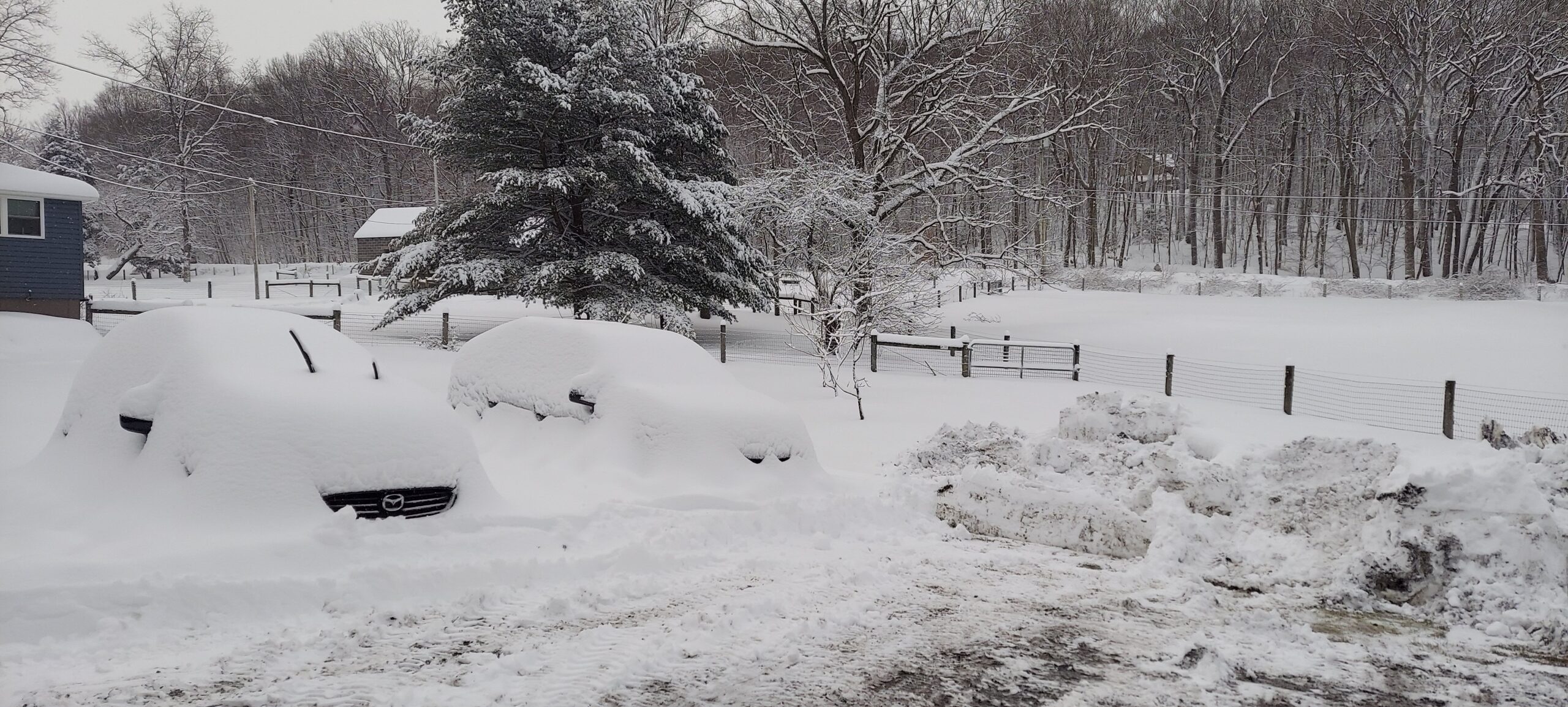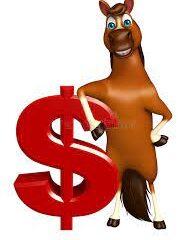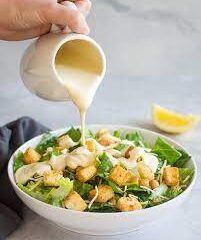Feeding Horses for Winter

Well it’s that time of year again, winter is near and everyone is trying to be proactive in getting weight on their horses before it arrives in full force.
My FaceBook group is blowing up as is my mailbox with questions about the best way to put weight on before winter and keep it on during winter.
Most of these questions are phrased along the lines of “What’s your favorite feed or supplement to gain weight for the winter?”
My answer is none.
Weight Management is Calorie Management
The arrival of winter certainly means some changes that relate to calorie consumption.
When the weather turns colder our horses use more calories to keep warm. On the other hand many of our horses don’t work during the winter. Some of our horses, like my mares, don’t ever work.
If your horse falls into this category and work falls off during the winter it is sometimes a calorie “wash” meaning that the additional calories burned in the cold are about equal to the calories burned while in work.
Some horses have the same workload all year round but many of these are clipped and blanketed to keep warm so these horses don’t burn as many calories to keep warm.
The point to be made here is that there are many variables in calorie management in the winter so assuming the horse will lose weight over the winter and trying to get ahead of the curve is sometimes not the best protocol.
If your horse is in a good weight coming into winter don’t anticipate making any radical changes to feed to compensate.
Obviously, if the horse begins to drop weight it is important to react to that loss.
My Favorite Feed or Supplement?
Without a doubt in my mind or hesitation in my reply the answer is forage.
When I see the comments and shout outs in these conversations very few people suggest increased forage. The most common replies I see are shout outs for senior feed, fat supplements and weight builders.
These supplements are not helpful in building or maintaining winter weight and in fact many times will be counterproductive.
One scary line of thinking is that straight corn is the best way to keep horses warm in the winter. This will almost certainly accomplish the opposite by setting up an environment ripe for hindgut acidosis and damaging the very biome that will keep your horse in good condition through the winter.
Hay is the Best Weight Gain Supplement for Horses
Forage is how horses have evolved to gain and maintain weight so it is important to provide plenty of it throughout the year.
During the winter hay offers another advantage for our horses. Internal heat.
If you’ve ever taken the time you will notice huge columns of steam rising over frash muck piles. This is the forage being fermented into compost by the same bugs that live in your horse’s hindgut.
As the fiber from forage ferments in the hindgut huge amounts of heat are liberated in the process. This is the main reason horses don’t consume nearly as much hay in the warm season months.
It’s hard to avoid the old wives tale about barns burning down because wet hay spontaneously combusted. There’s a really good reason for this.
Wet hay catching fire is not an old wives tale. Hay that is baled with too high a moisture content will catch fire.
I typically wait until late in the season to bring hay into my barn but if I have to bring in hay that was baled within four weeks of delivery I will use a meat thermometer to check the temperature of the bales. If the meat thermometer is more than about 15 degrees F warmer than the ambient air temperature I won’t take it off the truck. It ain’t done yet.
The other important element that is liberated in the horse’s hindgut are volatile fatty acids. This is how nature designed the whole system to work. VFAs are readily used by the horse’s body or easily stored for future use.
By providing free choice hay when the weather cools off our horses benefit from keeping warm as well as a reliable source of bioavailable fat.
Average grass hay provides about 800 calories per pound and they are highly available to the horse.
A three pound “flake” of hay will have more calories than a pound of Purina Ultium Competition and it will do a better job of weight maintenance than the feed.
Why Not Provide Calories in Feed and Supplements?
There are good reasons for not using feed to make up the calorie deficit.
Horses have not evolved to use high levels of supplemental fats in their diets. They have no gall bladder so all of the bile used to begin the process of breaking down the fat into a usable molecule is secreted as needed.
A horse will adapt to using supplemental fat but it can take weeks and so you are now well into winter.
If your horse is already using a concentrated feed to help with weight to offset work or condition then increasing it by a pound or so a day isn’t a bad idea.
Doubling the feed rate or introducing feed to a horse that is normally on balancer is not the best solution.
The feed will not contribute to keeping the horse warm or provide the extra VFAs that will be helpful to them.
Loading up with sweet feed, oats or corn will actually work against them in a big way.
What if Hay Is Hard to Find?
Forage replacements are still a better route to take than feed or supplements.
Grass hay pellets or cubes can be substituted for some or all of the forage diet if need be. Cubes will take a bit longer for them to eat which is helpful but soaking them can be a problem in the winter.
Beet pulp is an excellent winter forage replacement. Beet pulp is very high in soluble fiber while being average in protein and low in non structural carbohydrates.
Beet pulp is also available in pellets so if soaking the shreds is a problem during the winter feel free to use them.
Horses Are Designed to Lose Weight in Winter
Nature intends for horses to lose a little weight in the winter to prepare them for the bounty of spring grass.
During the winter the horse’s metabolism will switch from “store” mode to “burn” mode so they are naturally going to divert more of their diet to generating heat as a priority to VFAs.
As we move into spring the mode switches back and when the days get longer in March they are back to storage mode.
My mares will double their hay consumption in the dead of winter and actually gain weight to the point where they will require slow feed nets and restricted hay until about mid June.
Age and Condition are Factors
Of course as our horses get older or are managing conditions like PPID we may need to bring in more concentrated feed solutions. However, these will typically be required for the remainder of the year.
Older horses with poor dentition will need more forage replacement products since they can’t process hay as well.
The vast majority of horses will thrive on increased forage throughout the winter months and will fare much better than loading them up with fat and sugar calories.


